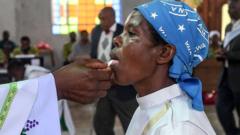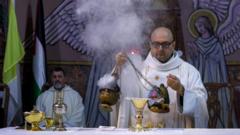With Africa's Catholic population significantly growing, discussions arise around whether the next Pope could come from the continent. Perspectives vary on the implications of such a choice among Catholic leaders.
**The Next Papal Election: Is Africa's Time Now?**

**The Next Papal Election: Is Africa's Time Now?**
The potential for the first African Pope since the 6th century has sparked discussions about representation in the Catholic Church.
As the world watches the potential conclave for the next Pope, many are questioning if the next leader of the Roman Catholic Church will emerge from Africa. The continent currently boasts the fastest-growing Catholic population, accounting for over 20% of the global congregation, raising speculations about whether the cardinal-electors will consider this trend when selecting Pope Francis' successor.
Father Stan Chu Ilo, a Nigerian priest, asserts that appointing an African Pope could more accurately reflect the Church's demographics. However, he acknowledges the challenge posed by the lack of prominent African clerics within the Vatican, suggesting that the cardinals might prefer someone already established in global Catholicism.
Historical context reveals that while three Popes have hailed from Africa, the last, Pope Gelasius I, served over 1,500 years ago. Cardinal Peter Turkson from Ghana was considered a strong candidate during prior conclaves, but the current slate lacks similarly prominent African voices, which some believe undermines the possibilities for representation.
Father Paulinus Ikechukwu Odozor challenges the notion of appointing a Pope simply based on continental origin, suggesting it risks tokenism. He emphasizes the need for a Pope versed in the Church's theology, capable of addressing the myriad concerns faced by congregants worldwide, regardless of their background.
Pope Francis' extensive engagement with Africa has bolstered the perception of Africa's significance to the Church. Despite this, criticisms arise regarding the treatment of African church issues at the Vatican. Some in Africa worry that their interests are overlooked, implying that only a pope of African descent could adequately prioritize these matters.
Recent approvals for blessings for same-sex couples also reveal a cultural rift, as many African bishops have resisted change on this issue. Cardinal Fridolin Ambongo Besungu and Cardinal Robert Sarah have both articulated resistance to liberal stances on sexual orientation, reflecting traditional values.
The potential for racism affecting African clergy's ascension to higher positions within the Vatican has also been raised. Odozor warns that regardless of qualifications, an African Pope might be perceived under racial lenses, complicating acceptance within the global Church community.
As speculations intensify with the possibility of a conclave, observers like Father Chu Ilo hope the next Pope will embody virtues of compassion and outreach reminiscent of Pope Francis. Yet, the unpredictability of the election remains, highlighting the complexities of a changing Church in a modern world where representation matters.
In an era of evolving dynamics within the Catholic Church, the question remains: will the next leader be African? As the world turns its eyes to the Vatican, only time will reveal the outcome of this historic election.
Father Stan Chu Ilo, a Nigerian priest, asserts that appointing an African Pope could more accurately reflect the Church's demographics. However, he acknowledges the challenge posed by the lack of prominent African clerics within the Vatican, suggesting that the cardinals might prefer someone already established in global Catholicism.
Historical context reveals that while three Popes have hailed from Africa, the last, Pope Gelasius I, served over 1,500 years ago. Cardinal Peter Turkson from Ghana was considered a strong candidate during prior conclaves, but the current slate lacks similarly prominent African voices, which some believe undermines the possibilities for representation.
Father Paulinus Ikechukwu Odozor challenges the notion of appointing a Pope simply based on continental origin, suggesting it risks tokenism. He emphasizes the need for a Pope versed in the Church's theology, capable of addressing the myriad concerns faced by congregants worldwide, regardless of their background.
Pope Francis' extensive engagement with Africa has bolstered the perception of Africa's significance to the Church. Despite this, criticisms arise regarding the treatment of African church issues at the Vatican. Some in Africa worry that their interests are overlooked, implying that only a pope of African descent could adequately prioritize these matters.
Recent approvals for blessings for same-sex couples also reveal a cultural rift, as many African bishops have resisted change on this issue. Cardinal Fridolin Ambongo Besungu and Cardinal Robert Sarah have both articulated resistance to liberal stances on sexual orientation, reflecting traditional values.
The potential for racism affecting African clergy's ascension to higher positions within the Vatican has also been raised. Odozor warns that regardless of qualifications, an African Pope might be perceived under racial lenses, complicating acceptance within the global Church community.
As speculations intensify with the possibility of a conclave, observers like Father Chu Ilo hope the next Pope will embody virtues of compassion and outreach reminiscent of Pope Francis. Yet, the unpredictability of the election remains, highlighting the complexities of a changing Church in a modern world where representation matters.
In an era of evolving dynamics within the Catholic Church, the question remains: will the next leader be African? As the world turns its eyes to the Vatican, only time will reveal the outcome of this historic election.





















